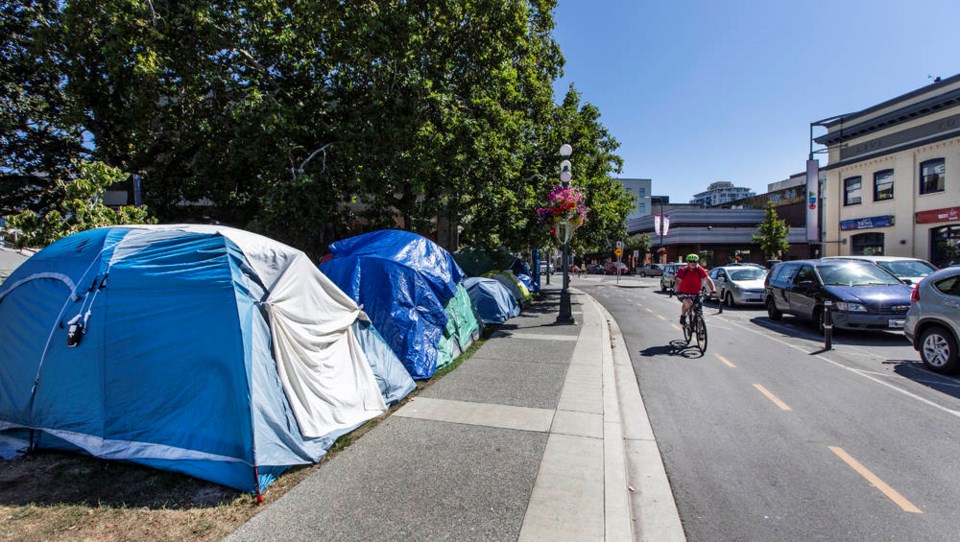An advocate for the homeless is cautioning against focusing on where unsheltered people in Victoria come from, calling it “a slippery slope.”
Julian Daly, CEO of Our Place Society, said he doesn’t think someone’s hometown matters when it comes to providing services or setting policy to support the most vulnerable people in the community.
“People in need are people in need,” he said.
Daly’s comments came after Victoria Police Chief Del Manak said in an interview with CTV that people are coming to Victoria from across the country because they’ve heard they’ll be offered housing, citing anecdotal accounts from his officers.
Manak was addressing the challenges homeless encampments pose for his officers, who he said are stretched thin trying to identify prolific offenders responsible for a surge in violent crime during the pandemic, and ensuring chronically ill people on Victoria streets are looked after.
“We are seeing an influx of people from out of town, all across the province and the country, in fact, that are coming to Victoria for a place to stay,” Manak said on Tuesday. “It’s unfair that our city and our local government has to deal with these issues. We’re having challenges dealing with them locally, let alone dealing with them at a larger scale from people that are coming into Victoria.”
Manak said his officers recently spoke to a couple who used their Canada Emergency Response Benefit payment to drive from Ontario to Victoria, because they need a place to live and heard they would be offered housing here.
“People definitely are here from out of town, out of province, looking for a free place to stay,” he said.
His comments drew criticism online, with some questioning what evidence the chief had to support the claim that large numbers of people from out of town are heading to Victoria, besides anecdotes from his officers.
Manak declined an interview request.
The latest publicly available data on the homeless population in Greater Victoria, gathered in a Point-in-Time count in mid-March, showed that 84 per cent of the 854 people surveyed had lived in the region for at least a year, although that doesn’t reflect potential changes in the community since the pandemic began.
Daly said he has not noticed an influx of people from out of town accessing support at Our Place, while acknowledging that police could be interacting with a different population than those he meets at the Pandora Avenue community centre.
He said someone’s origins shouldn’t dictate whether they get the help they need, and he’s concerned that it’s become part of the public conversation around homelessness.
“I don’t understand what is the point of it. Is it to say that if you don’t come from Victoria, you shouldn’t get services? So, are we going to stop people coming in here?”
But Rob Gillezeau, an assistant professor of economics at the University of Victoria, says information about where people experiencing homelessness in Victoria have come from can be valuable for crafting policy.
Gillezeau, whose research focuses on economic history and public policy, said periods of economic downturn generally lead to migration to cities with milder climates, as people lose their homes and look for warmer temperatures to survive the winter.
“If you are homeless and there is not shelter space available, it’s not unexpected that people would try to go somewhere where they wouldn’t freeze to death,” he said.
That’s what happened during the Great Depression, he said, when cities with warmer winters saw “pretty substantial migration.”
Gillezeau said it wouldn’t be surprising if the economic fallout from COVID-19 had the same effect in Canada, which could bring greater challenges for relatively warm cities like Victoria. Information on the migration of individuals in need of housing would be valuable to understand what extra help might be needed in the city, he said.
“If anything, that means that provincial and federal governments should provide more support to places like Vancouver and Victoria in downturns,” Gillezeau said.
Federal funding to address homelessness is something Victoria Mayor Lisa Helps has been calling for during the pandemic. The province and advocates for the homeless also say more help is needed from the federal government.
Helps said Friday the city doesn’t want to encourage people seeking shelter to come to Victoria.
“There are no free homes. There aren’t even enough homes for the people who are already here,” she said.
Helps said council has asked B.C. Housing and Island Health, which are responsible for the housing-placement process, to prioritize people for housing who have been living in the region for at least a year.
Some critics of encampments in Victoria have argued that the province’s purchase of motels to house people and council’s decision to allow 24/7 sheltering in parks have incentivized people to move to Victoria in search of a place to set up a tent or free housing.
Helps rejected the claim, saying there are encampments in almost every major city in Canada, including 40 across B.C.
“We are dealing with the crisis on our doorsteps, as are all cities across the country,” she said.
The claim that services or policies in Victoria attract people to the region is no reason to advocate against providing support for a vulnerable community, said Colin Macleod, UVic’s chair of philosophy, who has a special interest in moral and political philosophy.
Macleod said homelessness is an “ethical failing” that society is not adequately addressing, and competing in “a race to the bottom” in terms of support would disadvantage a community in need.
He said he understands why some might worry that Victoria is unfairly taking on the cost of supporting people in need, but a reduction in support is not the answer.
“Probably the words of [provincial health officer] Bonnie Henry in this context are ethically appropriate, and that’s the injunction to be kind. And kindness is often most needed towards our most vulnerable communities,” Macleod said.



